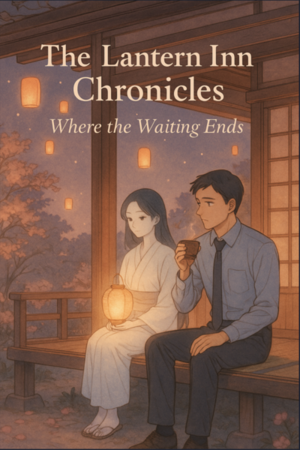Chapter 8:
The Woman Who Carried a Name Too Long
Lantern Inn Chronicles
Kaito was slowly beginning to understand that this place—the Lantern Inn, suspended between worlds—wasn’t heaven. And it wasn’t purgatory either. It was something quieter, stranger. A waiting room, perhaps, for souls not yet ready to pass through.
They didn’t come here because they were evil or broken beyond repair. They arrived because something within them remained unresolved. A memory too loud, a word never spoken, a goodbye left unfinished.
It was in this space, timeless and soft-edged, that Kaito found himself changing. Not healing—he wasn't ready to use that word—but listening more closely to things most people ignored. Like the way the wind paused near unopened doors. Or how certain footsteps hesitated before entering a room.
That’s where he met her.
She was sweeping fallen plum petals from the stone steps of the temple courtyard. Not because they were many, or because anyone had told her to. She swept because it was what she always did. Her white robe was faded, patched in places, yet still carried a sense of dignity. Her hair was tied back simply, with a neatness that reminded Kaito of his mother—the kind of care women took when they were angry, but didn’t want to show it.
She looked up, unsurprised, as if she’d known he would arrive.
“You must be the new one,” she said.
“I suppose I am,” Kaito replied, unsure whether to bow or not.
She tilted her head slightly. “And what’s your name, boy?”
“Kaito. Kaito Moriyama.”
She paused, then gave a small, faint smile. “...A kind name,” she murmured. “No cuts in it.”
Kaito blinked. “Cuts?”
“My father called me Onibaba once,” she said, her voice like gravel softened by rain. “I was thirteen. I’d scowled at something he said, and he joked I looked like the old demon-witch from the stories.”
She leaned on her broom now, knuckles pale against the wood. “It was just a joke. A cruel one. My brothers laughed, then used it too. My husband thought it was funny. My children picked it up like a game.”
Her voice didn’t tremble—but her eyes did.
“Eventually, it stuck. I started becoming her. The hag. The monster in the corner of the room. Until one day, I forgot the girl I used to be. And they did too. By the end… even I didn’t remember my real name.”
She glanced at the petals scattered by her feet. “Now, I’m just her.”
Kaito sat quietly on the steps, unsure what to say. The silence between them stretched long and gentle, like a thread waiting to be tied.
“You know,” he said finally, “a name only survives if it finds a place to root. You’re not that word. You never were.”
She gave a dry chuckle. “Spoken like someone who never had their name twisted into a weapon.”
But Kaito understood more than she thought.
“‘Moriyama, you’re so dull.’”
“‘Kaito? Which one was he again?’”
“‘You’re like background noise—useful, but forgettable.’”
He’d been misremembered more than mocked. His name hadn’t been weaponized; it had been erased. Worn down until it meant nothing. That, too, left scars.
He stood and bowed to her.
“Then… may I ask your real name?”
She looked at him with weary, searching eyes.
“I don’t remember it,” she said, voice barely a whisper.
“Then let’s find it together,” Kaito replied.
They combed through old temple ledgers and handwritten scrolls. Walked the garden paths, pausing where memory seemed thick in the air. They spoke to other souls—visitors who had known her in life, however distantly. One remembered her favorite rice dish. Another, the way she hummed while braiding onions. Tiny fragments of a forgotten self.
On the third morning, as mist clung to the koi pond, she wept.
“My mother,” she whispered, “used to call me Kana.”
She said it as if confessing a secret. Or perhaps as if asking permission.
“Kana,” Kaito repeated. “That’s a beautiful name.”
She smiled—not politely, but with a kind of unguarded freedom he hadn’t seen in her before. Her shoulders seemed lighter, her form less shadowed.
“Then… I will be her again,” she said.
That night, she vanished.
No thunder. No flash of light. Just the faint scent of jasmine lingering in the courtyard. A name, returned to the air.
Rin found Kaito beneath the plum tree, eyes reflecting the moonlight.
“You help people remember who they were,” she said. “Even when they’ve forgotten.”
“I think it’s because I spent most of my life invisible,” he answered. “So now… I see what others overlook.”
She handed him a warm rice ball without a word. He took it with quiet gratitude.
“Maybe,” she said, “this world needs people like you more than it needs heroes.”
Later that week, as dusk pressed softly against the wooden frames of the Lantern Inn, a knock—or perhaps just a presence—came to the door. Kaito had felt it more than heard it, like the air itself shifting slightly. He stood there in the doorway, tall and still, the light behind him casting a warm glow against the gathering grey outside.
The woman who stood there carried no name.
She came alone, her silhouette blurred by the fading light. Her sleeves were stained with the dull dust of long travel, her white kimono clinging to her with a damp weight. Strands of hair, dark and matted by moisture, fell across her face. There was no umbrella in her hand, no luggage at her feet. Only the quiet gravity she brought with her—like she had been walking with silence as a companion for years.
Kaito didn’t ask who she was.
He simply stepped aside.
His posture was careful, almost ceremonial—shoulders squared, head slightly bowed, the way he always welcomed those who carried burdens they hadn’t named yet. There was something deliberate in the way he moved, like water guided by stone: patient, unobtrusive, steady. His eyes, calm and unreadable, briefly met hers—and in that moment, she understood he would not demand anything from her. Not her story. Not her sorrow. Not even her name.
That night, the rain came—not with force, but with memory. A drizzle that soaked rather than cleansed. The kind of rain that didn’t disturb the past but made you feel it again.
Inside, Kaito moved through the kitchen with the practiced grace of someone who had once lived invisibly. His frame was lean but not frail, his sleeves rolled back, revealing forearms lined with faint burn marks from years of working in places where no one noticed the boy behind the counter. His hands—long, deft fingers—prepared the tea as if performing a rite.
He made her genmaicha—roasted rice and green tea. He chose it not just for the warmth, but for the faint nuttiness it carried. A comforting, familiar note in a world that felt forgotten. It was the same kind his old neighbor Tanaka-san used to make for him after long shifts when the vending machines ran out of dinner and the fluorescent lights of the office flickered with indifference.
He placed the cup before her on the low table. He didn’t speak. She didn’t drink.
She sat for hours on the wooden floor of the hallway, her knees drawn to her chest, eyes fixed on the paper-thin walls. Behind them, the garden blurred beneath the mist—stones softened, trees blurred, silence thick like fog. Emi passed by once, her ghost-pale form floating softly. She tilted her head, curious, then floated on—saying nothing, offering the same unspoken grace Kaito had.
When the hour grew late, Kaito returned with a folded blanket. He knelt before her, gently held it out.
That was when she finally spoke.
Not her name.
Just a question.
“Do you think grief has an expiry date?”
Her voice cracked—not with emotion, but age. Like it had been buried under dust and memory, and speaking now was an act of excavation. Her tone wasn’t desperate. It was distant. Like someone calling out from across a river she no longer hoped to cross.
Kaito sat beside her. Not close. Not far. Just beside. The blanket still in his lap.
He didn’t answer right away. He folded his hands in his lap, stared at the floor, and let the silence settle again before he spoke.
“I think,” he said slowly, “some names echo longer than they should. Even when the lips that once called them are gone.”
He placed the blanket over her knees. Then rose, returned to the tea, and gently repositioned the cup—closer to her hands.
He didn’t wait for a thank you.
He didn’t try to coax a story from her silence.
He simply stayed nearby, present without presence. Watching the steam rise, then fade, from a cup untouched.
Time passed with the same quiet reverence that defined the Lantern Inn. It did not rush. It did not interrupt.
The next morning, the tea was still there.
Cold now. The steam long vanished. But the cup had shifted—just slightly. A trace. A clue. A quiet mark of contact.
Beside it lay a small, folded towel. And on it: a black-and-white photograph.
A child—no more than five—with a gapped grin, cheeks round and radiant, held in the arms of someone cropped from the frame. Joy immortalized, but incomplete. On the back, in careful strokes of faded ink:
“To mama — I’ll grow tall enough to reach the stars.”
Kaito stood for a long time, holding the photo in both hands.
His fingers trembled slightly—not from cold, but recognition. Of a kind of love too large for one life to contain. A grief without an address.
Without a word, he carried the photo to the wooden memory box beside the hearth. He opened it gently, placing the photo inside among the other remnants—forgotten buttons, faded letters, broken pendants—that waited for their stories to be remembered.
He never saw her again.
But for the next three mornings, he made tea.
Not because he expected her.
But because part of him still hoped she might sit again in that hallway, watching the rain.
And because he knew: sometimes, just knowing someone once held the cup was enough.
Kaito, twenty-four, stood at the threshold of a small apartment complex nestled between grey buildings that looked too tired to bother with beauty. The air was cold, not quite winter, but sharp enough to bite through his office slacks and settle into his bones. Overhead, the sky was the color of an unused eraser—blank, smudgeless, waiting for something to be written across it. The city behind him pulsed in its usual rhythm—indifferent and impatient. Taxi horns. Distant sirens. The quick clicks of high heels on concrete. No one paused. Not even him.
In his hand, a thin plastic grocery bag twisted in the wind, handles biting into his fingers. Inside were small, careful choices—sweet potatoes she liked to roast with cinnamon on rainy days, that particular brand of red-label miso she insisted had “just the right kind of salt,” and a bottle of bright neon-green melon soda she always claimed she bought “ironically,” though he knew better. He remembered the first time she gave him a sip—it had fizzed too much, made him cough, and she’d laughed so hard she dropped her chopsticks.
He took a breath.
Then another.
Then stepped toward her door.
The apartment looked the same—faded door number, a chipped wooden wind chime hanging above the threshold. Its bell had rusted over, but it still clinked faintly whenever the breeze dared to visit. He reached up—hand hovering near the doorframe, about to knock.
But then—
He heard her.
Not in the hall. Not from inside.
In his head.
The echo of a memory that arrived too clearly.
“You always come late.”
There had been no shouting when she’d said it. Just resignation.
“When it’s already too broken to fix.”
And he had. Too often. Apologizing with action instead of words. With gestures instead of presence. With groceries, with small kindnesses offered far after the storm had passed and left debris in its place.
He lowered his hand.
The bag rustled slightly as he set it beside the door, careful, like he didn’t want to wake something sleeping inside.
He stood there a moment longer—his shoulders curved slightly inward, not from the weight of the bag, but the burden of something heavier and far more familiar. Regret. Inheritance. Grief not yet acknowledged.
Then he turned.
Walked back the way he came. Each step slower than the last. His shoes made soft, hollow sounds against the cement—like echoes of an apology he would never say aloud.
Behind him, the wind chime stirred once more.
He didn’t look back.
Present: Lantern InnNow, Kaito sat cross-legged beside the old iron kettle in the inn’s dim kitchen. The light from the oil lamp flickered across his features—more weathered now, but calmer. He stared at the rising steam with a stillness that seemed earned, not passive. Each spiral of vapor curled upward into the air like incense at a shrine. It reminded him of temples his mother used to take him to—before everything turned into schedules and silences.
There was no need for noise here. Not anymore.
The inn held a particular kind of hush—not silence, but listening. A space that didn't demand, only welcomed.
He had learned, slowly and sometimes painfully, that not all visitors needed to be fixed. Some did not seek answers. Some simply came to exist for a moment in peace—like the woman who left the photo behind. Like the man who had once returned each night just to sit in the hallway and say nothing. Like the child who laughed only in dreams.
Not everyone stays.
Not every memory leaves a name.
Some arrive wrapped in silence, and that silence is sacred.
And Kaito, who had once felt invisible in a world that never waited, now became the one who waited—for strangers, for moments, for quiet goodbyes no one else would notice.
Even a cold cup of tea held meaning.
It meant someone had lingered long enough to be warmed once.
It meant presence.
And for Kaito, that was enough.
His role wasn’t to solve or to speak.
It was to bear witness.
To see gently.
To remember.
Even when no one else did.
Especially then.
He looked toward the hallway where the tea cup had once rested. A shadow passed, maybe real, maybe memory.
The kettle hissed gently, its steam curling upward once more.
Kaito closed his eyes.
And listened.




Please sign in to leave a comment.